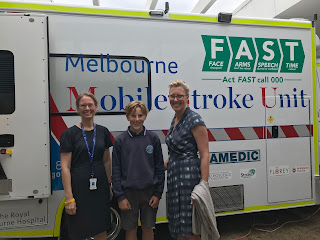Acute stroke is one of the main causes of death and chronic disability globally. In acute stroke management
‘time is brain’;
thrombolysis with recombinant tissue plasminogen activator within the first
hours after onset of symptoms is an effective therapeutic option for ischemic stroke.
 Professor Klaus
Fassbender from Homburg an der Saar suggested over 20 years ago to bring the
hospital to the patient. This has become a reality in the form of mobile stroke
units. This strategy is based on the use of an ambulance (mobile stroke unit)
equipped with an imaging system, a point-of-care laboratory, a telemedicine
connection to the hospital, and appropriate medication. Studies of prehospital stroke treatment consistently report a reduction in
delays before thrombolysis and cause-based triage in regard to the appropriate
target hospital (e.g., primary vs comprehensive stroke centre).
Professor Klaus
Fassbender from Homburg an der Saar suggested over 20 years ago to bring the
hospital to the patient. This has become a reality in the form of mobile stroke
units. This strategy is based on the use of an ambulance (mobile stroke unit)
equipped with an imaging system, a point-of-care laboratory, a telemedicine
connection to the hospital, and appropriate medication. Studies of prehospital stroke treatment consistently report a reduction in
delays before thrombolysis and cause-based triage in regard to the appropriate
target hospital (e.g., primary vs comprehensive stroke centre).
Earlier this
year the Royal Melbourne Hospital launched an $8 million pilot project, hosting the first
Mobile Stroke Unit in the southern hemisphere.
There are only a dozen Mobile
Stroke Units currently operating in the world. All are in the northern
hemisphere – including three in Germany and five in USA
In Houston USA, 70 percent of patients were treated
within 90 minutes of symptoms including 40 percent in the first hour, compared
to less than one percent of hospital-treated stroke patients being treated in
the first hour
We’ve had a real focus on these
innovative trials at the World Stroke Organisation, publishing a module on theWorld Stroke Academy, earlier in the year we interviewed Professor
James Grotta for a PODCAST for the International Journal of Stroke
as an accompaniment to the article The PRE-hospital Stroke TreatmentOrganization.
Here
are some of the MSU published articles in IJS.
Air-Mobile Stroke Unit for access to stroke treatment in rural regions.
Walter S1,2, Zhao H3, Easton D3, Bil C4, Sauer J4,5, Liu Y1, Lesmeister M1, Grunwald IQ6,7, Donnan GA2, Davis SM3, Fassbender K1.
Translation of the 'time is
brain' concept into clinical practice: focus on prehospital stroke management.
Ragoschke-Schumm A1, Walter S, Haass A, Balucani C, Lesmeister M, Nasreldein A, Sarlon L, Bachhuber A, Licina T, Grunwald IQ, Fassbender K.
 |
| Dr Silke Walter with the MSU team at Southend on the Sea. |
 | |
|
 |
| Dr Silke Walter with Geoffrey Donnan and Stephen Davis from the Melbourne Unit launch. |
 |
| Dr Silke Walter, Skye Coote and Managing Editor IJS Carmen Lahiff-Jenkins. |
 |
| Sharon McGowen, CEO National Stroke Foundation and Ned Lipes from Medtronic. |
 |
| Dr Silke Walter, Peter Newbry and a rep from Medtronic. |





